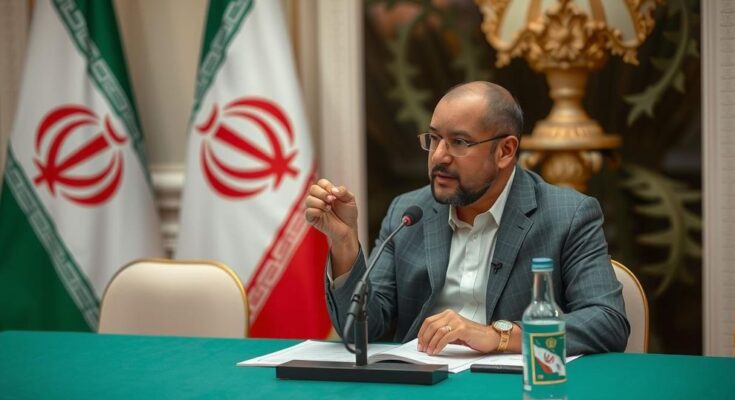Iran’s government spokesperson highlighted diplomatic efforts around the JCPOA snapback mechanism, emphasized enhancing relations with Egypt during an upcoming presidential visit, and discussed economic initiatives tied to coastal development. Additionally, there is optimism regarding FATF approval, indicating proactive engagement with international financial standards.
In a recent cabinet meeting in Tehran, Fatemeh Mohajerani, the spokesperson for the Iranian government, expressed concerns regarding the potential activation of the snapback mechanism associated with the 2015 Joint Comprehensive Plan of Action (JCPOA). Mohajerani emphasized the importance of rational decision-making from Western nations to facilitate diplomatic resolutions, insisting that Iran is committed to dialogue as a means of resolving contentious issues. She stated, “We have consistently emphasized our commitment to resolving matters through negotiation,” reflecting Iran’s openness to diplomatic engagement with international parties involved.
The snapback mechanism allows for the reinstatement of UN sanctions in response to alleged noncompliance with the JCPOA, a process that has seen considerable contestation from various geopolitical actors. On another note, the spokesperson highlighted an upcoming presidential visit to Egypt, noting improvements in diplomatic relations achieved through sustained effort. She articulated that the visit aims to enhance economic ties and diplomatic interactions, indicative of Iran’s broader regional strategy.
Furthermore, Mohajerani addressed domestic economic initiatives, announcing the approval of several projects, including strategic amendments to the Makran Coast Development Council`s charter. This initiative, aligning with Ayatollah Seyed Ali Khamenei’s directives, underscores the significance of coastal development as a vehicle for economic growth. “Our country’s coastline, particularly the Makran coast, is a significant asset and can serve as a major economic driver for us,” she conveyed.
Her commentary extended to the prospects of Iran’s approval by the Financial Action Task Force (FATF), with positive indications emerging from the Expediency Discernment Council. Mohajerani expressed hope that efforts towards the FATF alignment will advance, reinforcing the country’s commitment to addressing national interests through collective stakeholder engagement. She concluded with optimism regarding the conducive environment for resolving various challenges facing the nation.
The snapback mechanism is a crucial component of the 2015 JCPOA, designed to facilitate the re-implementation of UN sanctions in response to claims of noncompliance by member states. Iran’s stance on this mechanism has been one of resistance to what the government perceives as politically motivated allegations. Concurrently, Iran aims to strengthen its diplomatic ties with Egypt, marking a notable engagement in regional politics. Moreover, the FATF, which oversees international standards for combating money laundering and terrorism financing, remains a complex issue for Iran, as aligning with these standards is vital for economic stability and international cooperation.
In summary, the Iranian government, represented by spokesperson Fatemeh Mohajerani, advocates for diplomatic resolutions regarding international tensions, particularly concerning the snapback mechanism of the JCPOA. The upcoming diplomatic visit to Egypt illustrates Iran’s desire to enhance regional cooperation and economic development, while recent domestic initiatives signal a commitment to leverage coastal resources for economic gain. The positive outlook regarding FATF approval suggests an ongoing effort to tackle national challenges through collaborative governance.
Original Source: www.tehrantimes.com




